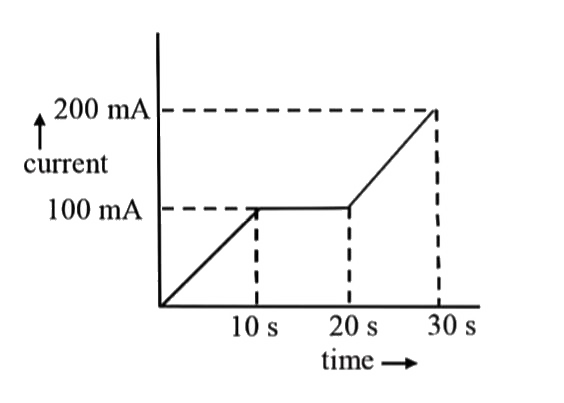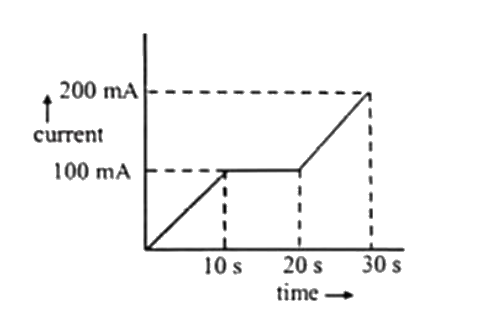What is meant by electrochemical equivalent of a substance?
Step-by-Step Text Solution:
1. Definition of Electrochemical Equivalent: The electrochemical equivalent (Z) of a substance is defined as the mass of the substance that is deposited or liberated at an electrode during electrolysis when one equivalent of electric charge passes through the electrolyte.
2. Faraday's Law of Electrolysis: According to Faraday's laws of electrolysis, the mass (m) of a substance deposited or liberated at an electrode is directly proportional to the quantity of electric charge (Q) that passes through the electrolyte. This can be expressed mathematically as:
m∝Q
or
m=Z⋅Q
where Z is the electrochemical equivalent.
3. Relationship Between Charge and Current: The quantity of charge (Q) can also be related to current (I) and time (t) using the formula:
Q=I⋅t
4. Combining the Equations: Substituting the expression for Q into the equation for mass gives:
m=Z⋅(I⋅t)
5. Rearranging for Electrochemical Equivalent: From the equation above, we can express the electrochemical equivalent (Z) as:
Z=mI⋅t
where:
- m = mass of the substance deposited (in grams)
- I = current (in amperes)
- t = time (in seconds)
6. Conclusion: Thus, the electrochemical equivalent of a substance is a measure of how much mass of that substance is deposited per unit charge passed through the electrolyte. It is a crucial parameter in electrochemistry for understanding the efficiency and effectiveness of electrolysis processes.
---
m∝Q
or
m=Z⋅Q
where Z is the electrochemical equivalent.
Q=I⋅t
m=Z⋅(I⋅t)
Z=mI⋅t
where:
- m = mass of the substance deposited (in grams)
- I = current (in amperes)
- t = time (in seconds)
Topper's Solved these Questions
- BOOK - ICSECHAPTER - ELECTROCHEMISTRYEXERCISE - EXERCISE (PART-II Descriptive Questions)(SHORT ANSWER QUESTIONS)38videos
ELECTROCHEMISTRY
- BOOK - ICSECHAPTER - ELECTROCHEMISTRYEXERCISE - EXERCISE (PART-II Descriptive Questions)(LONG ANSWER QUESTIONS)33videos
ELECTROCHEMISTRY
- BOOK - ICSECHAPTER - ELECTROCHEMISTRYEXERCISE - EXERCISE (PART-I Objective Questions) (Choose the correct alternative)25videos
ELECTROCHEMISTRY
- BOOK - ICSECHAPTER - DISTINCTION BETWEEN PAIRS OF COMPOUNDS EXERCISE - QUESTIONS155videos
DISTINCTION BETWEEN PAIRS OF COMPOUNDS
- BOOK - ICSECHAPTER - GENERAL PRINCIPLES AND PROCESSES OF ISOLATION OF ELEMENTS EXERCISE - EXERCISE (PART-I ( OBJECTIVE QUESTIONS )) (Fill in the blanks)60videos
GENERAL PRINCIPLES AND PROCESSES OF ISOLATION OF ELEMENTS
Similar Questions
STATEMENT 1 : one coulomb of electric charge deposits the weight that is equal to electrochemical equivalent of substance and
STATEMENT 2 One faraday deposits one mole of substanceView SolutionThe unit of electrochemical equivalent is
View SolutionWhat is meant by heterosis?
View SolutionWhat is meant by amu ?
View SolutionIn a Cu-voltameter, mass deposited in 30s is 'm' g. If the time -current graph is shown in the following figure :

What is the electrochemical equivalent of Cu ?View SolutionIn a Cu - voltmeter, mass deposited in 30 s is m gm. If the time - current graph is shown in the following figure

What is the electrochemical equivalent of Cu?View SolutionWhat is meant by zero isothermal ?
View SolutionWhat is meant by thermal equilibrium?
View SolutionThe electrochemical equivalent of a substance is numerically equal to the mass of the substance deposited if a current 1 flows through the electrolyte for 0.25 seconds. The value of 1 is
View SolutionWhat is meant by racemic mixture ?
View Solution

